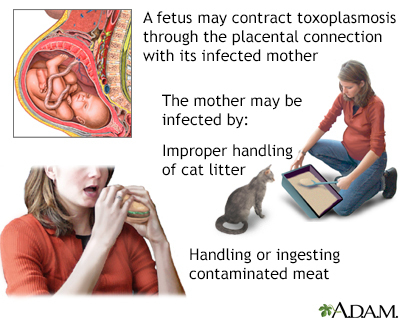Toxoplasmosis
A cuddly kitten slaps a ball of yarn as it entertains the family. But that furry friend’s busy paws may carry an unwanted...
Update your location to show providers, locations, and services closest to you.
Toxoplasmosis is an infection due to the parasite Toxoplasma gondii.
Toxoplasmosis is found in humans worldwide and in many kinds of animals and birds. The parasite also lives in cats.
Human infection may result from:
Toxoplasmosis also affects people who have weakened immune systems. These people are more likely to have symptoms.
The infection may also be passed from an infected mother to her baby through the placenta. This results in congenital toxoplasmosis.
There may be no symptoms. If there are symptoms, they usually occur about 1 to 2 weeks after contact with the parasite. The disease can affect the brain, lung, heart, eyes, or liver.
Symptoms in people with otherwise healthy immune systems can include:
Symptoms in people with a weakened immune system can include:
The health care provider will perform a physical exam. Tests that may be done include:
People without symptoms usually do not need treatment.
Medicines to treat the infection include an antimalarial drug and antibiotics. People with AIDS should continue treatment for as long as their immune system is weak, to prevent the disease from reactivating.
With treatment, people with a healthy immune system usually recover well.
The disease may return.
In people with a weakened immune system, the infection may spread throughout the body, leading to death.
Contact your provider for an appointment if you develop symptoms of toxoplasmosis. Medical care is needed right away if symptoms occur in:
Also seek medical treatment right away if the following symptoms occur:
Tips for preventing this condition:
Pregnant women and those with weakened immune systems should take the following precautions:
Pregnant women and those with HIV/AIDS should be screened for toxoplasmosis. A blood test can be done.
In some cases, medicine to prevent toxoplasmosis may be given.


Mcleod R, Boyer KM. Toxoplasmosis (Toxoplasma gondii). In: Kliegman RM, St. Geme JW, Blum NJ, Shah SS, Tasker RC, Wilson KM, eds. Nelson Textbook of Pediatrics. 21st ed. Philadelphia, PA: Elsevier; 2020:chap 316.
Montoya JG, Boothroyd JC, Kovacs JA. Toxoplasma gondii. In: Bennett JE, Dolin R, Blaser MJ, eds. Mandell, Douglas, and Bennett's Principles and Practice of Infectious Diseases. 9th ed. Philadelphia, PA: Elsevier; 2020:chap 278.
A cuddly kitten slaps a ball of yarn as it entertains the family. But that furry friend’s busy paws may carry an unwanted...